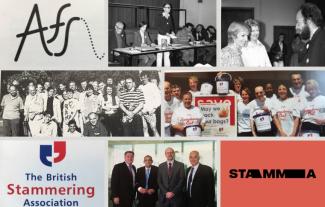
Read about STAMMA's rich history stretching back over 40 years, and the people who started it all.
We have been in existence for over 40 years, firstly as the Association for Stammerers, then the British Stammering Association, and now STAMMA.
Because we were one of the earliest charities founded to support people who stammer, we've developed a formidable international reputation. So although membership is only open to people aged over 16 who live in the UK, we have a mailing list which covers the globe.
Over the years our focus has expanded from supporting people who stammer to include parents and guardians, speech & language therapists, teachers and professionals working with those who stammer. Attitudes around stammering, how it's referred to, whether or not it is a disability, whether we should seek a 'cure' — these are the issues that have shaped us.
At our heart we are here to support those who stammer: to help them enjoy respect and consideration, and be able to fulfil their potential. We are here for those who want to work on their stammering, for those who want to accept the way they speak, and for everyone engaged in supporting those who stammer.
Send us your old photos
If you have any photos taken from our history, we'd love to add them to our archive. Please send them to hello@stamma.org
Association for Stammerers (AFS)

Sparrow Harrison
In the early 1960s, a young man, 'Sparrow' Harrison, felt he had too severe a stammer to do anything other than manual work. His family paid for Sparrow to receive support from Henry Burgess, who taught people who stammered methods of speaking more easily. Burgess used to travel round to different places, including private schools, teaching these methods, and he asked Sparrow to help him out.
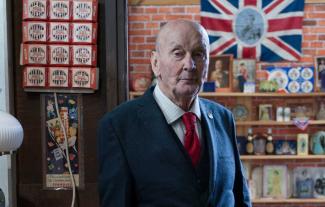
Following Burgess's death in 1978, Sparrow took over the running of the classes and was faced with the dilemma of what to do with them. Knowing he didn't want to charge people a lot of money to be 'cured' when he knew there wasn't one, he decided to change it into a self-help association, based in London.
I was left holding his stammering empire. I thought long and hard about what I would do with it...
(Sparrow Harrison)
Working with others, Sparrow ran free classes before and after work. People who stammered came from all over the country to attend. Sparrow's reputation grew, and he was invited to appear on Woman's Hour, Pick of the Week and local radio and TV.
Peggy Dalton
In 1977, Peggy Dalton, a speech & language therapist, announced that she wanted to start a national association for people who stammer. After attending one of Sparrow's self-help groups, she suggested joining forces and Sparrow agreed.
At the inaugural meeting in 1978, the group was formed taking the name 'Association for Stammerers (AfS)'. Peggy looked after the running of the organisation and Sparrow was made the first Chair, a position he held for nine years. Sparrow said of Peggy, "She gave the organisation the respect I don't think I could have given it and it made us into a much more successful organisation".
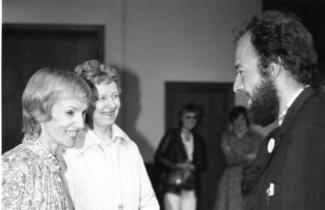
Early days
In 1979, the AfS became a registered charity with a remit to 'undertake the relief of persons suffering from the speech impairment of stammering'.
Ron Turrell, who was involved at the start, said, "The initial aim was to encourage and support self-help groups across the UK. Stammerers were invited to be members and pay a small annual fee to help for the running costs. There was quite a social theme too, with some barn dances and annual general meetings were rather special as members travelled from all over the country to enjoy the social side of the meeting, a buffet followed the meeting and people made long term friendships."
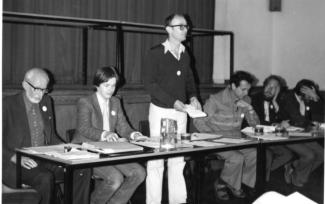
"Our secretary Craig Dunant, together with General Editor Lionel Halter," said Sparrow in his article, "deserve praise too for shouldering nearly all the work of getting the Association going".
In 1981, a cricket match was held between the AfS and a team of blind players to celebrate the 'International Year of the Disabled'. Sparrow said, "We had a problem in that when we were bowling, we had to shout "Are you ready?" followed by 'Play' once the batter indicated their consent. After long overs of batsmen waiting to be asked if they were ready — us being stammerers — and then finding the ball had gone past them when the bowler eventually said 'Play', it was decided that the umpire would do the shouting. We were on the way to being thoroughly beaten when the groundsman came to our rescue as he wanted to go home for the night. I told him we wouldn't hold him up, so we were able to declare the match a draw, much to our relief".
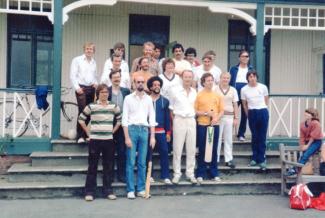
Sparrow gave up chairing the association in 1987 and Ron took over, with Sparrow becoming President. Sparrow said of Ron: "Although we were very different characters, he was just the right man for the job and played a very big part in keeping it going after I left".
Ron said, "I had been aware that the AfS could not expand or even survive run purely by volunteers. The job of supporting the growing number of self-help groups, area representatives and managing inquiries from the public, plus other activities, was becoming impossible to manage."
Fortunately, a legacy donated in the late 1980s enabled the charity to review its work, produce the AfS's first long-term strategic plan in 1988 and recruit its first members of staff. The legacy, together with effective fundraising and a successful bid to Telethon, brought in funds and an application to the Department of Health, as it then was, for match funding was successful.
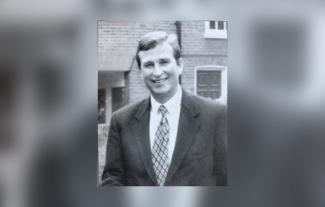
In 1989, after a motion was passed, Peter Cartwright was appointed the organisation's very first Director, and a small office was opened up in Blackfriars, London. By the end of the decade, the AfS encompassed 80 self-help groups and 32 area representatives.
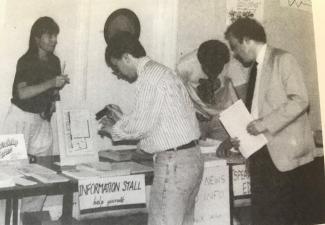
Early Patrons
Jonathan Miller became the AfS's very first patron. The famous actor, director, television presenter, humourist and medical doctor, who was part of the Beyond the Fringe comedy revue alongside Alan Bennett, Dudley Moore and Peter Cooke, stammered from a young age and demonstrated his support for people who stammer by becoming a patron. Read our tribute to Jonathan Miller, who passed away in 2019.
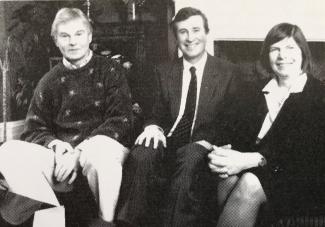
Acclaimed author Margaret Drabble (The Millstone, The Dark Flood Rises) also became a patron (see her interview with fellow writer and patron David Mitchell) as did Nicholas Parsons, legendary actor and TV personality. Nicholas helped launch the AfS's first ever colour poster aimed at helping children who stammer, in 1994 (pictured below).
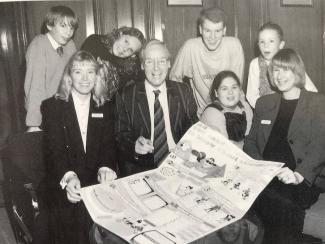
Helpline
The helpline has been at the heart of the organisation, providing information, support and guidance for people who stammer, worried parents, partners, friends, teachers, health professionals and employers. It was first launched as a helpline exclusively for parents in 1994, with the help of TV presenter Toby Anstis (see below). In 1998 this evolved into a national helpline for all affected by stammering, with the late broadcaster Desmond Wilcox, who stammered himself, helping to launch it at an event at Westminster.
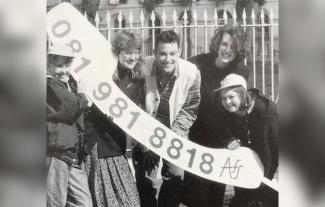
British Stammering Association (BSA)
After intensive consultation, on 20th May 1995 at a Special General Meeting, the Members voted overwhelmingly to change the name of the organisation to the British Stammering Association. Members also voted to open membership to include parents of children who stammered and speech & language therapists.
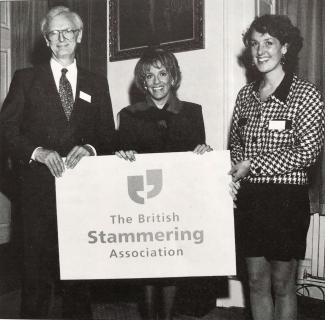
To maintain the principle of being user-led, it was also agreed that the majority of the Board needed to be people who stammered. The BSA transformation was completed on 27th August 2004, when the funds were transferred to new charity registration number 1089967, with the charitable objects as '(1) The relief and support of all whose lives are affected by stammering, and (2) to advance the education and training of the public in all matters relating to stammering.'
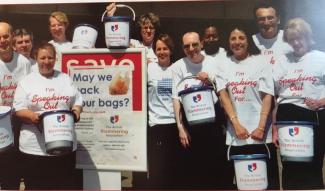
Norbert Lieckfeldt
Having starting as a volunteer in 1993, Norbert Lieckfeldt went on to lead the charity for almost twenty years, through many a difficult time, from our old office in Bethnal Green. He became Acting Director when Peter Cartwright left the BSA in the late 90s, in a role that was re-designated as Chief Executive in 2002.
Norbert left the BSA in April 2018 after 25 years with the charity, and in that time he was instrumental in helping to push stammering onto the national agenda, in education, employment and healthcare. Former Education Officer Cherry Hughes said in 2017, "I think for me the culmination of Norbert's achievements was to see him speak as the Gala Dinner guest speaker at the World Dysfluency Conference in 2014 in Oxford. This is the most prestigious meeting of stammering professionals. Norbert's speech was finely judged, humorous yet full of passion and conviction and it blew the audience away, so many ovations and a measure of how far the BSA and Norbert have come".

Conferences
The first National Conference took place in Derbyshire in 1995 and has since become an important biennial event in our calendar, and an opportunity to showcase new thinking, research and international discussions around stammering.
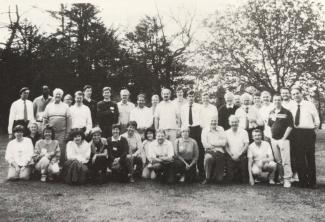
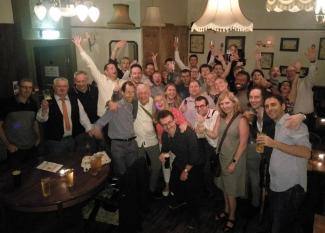
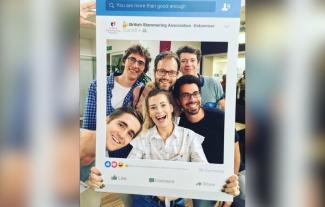
The BSA also launched its first Open Days alongside other social events. These allowed people who stammer (who very often had never met others who stammer) invaluable networking and learning opportunities, which members found life-changing.
Speaking Out
In 1978, the AfS started produced a regular printed magazine, 'Speaking Out'. The founding editor was Lionel Halter, who was a printer by profession, so he knew how to get it up and running. A much-loved publication, the magazine brought together the latest news about the charity and the stammering world, research, information about therapies, member's stories and thought-pieces around stammering. With the pressure on cutting costs and the rise in popularity of our website, the last copy went out in the summer of 2014.

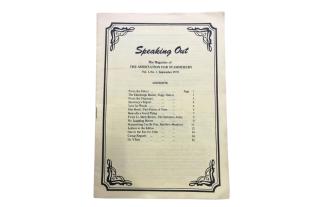
Children & Stammering
From the 1990s the BSA focused on raising awareness about the importance of early intervention for young children who stammer, led by Cherry Hughes, targeting primary healthcare workers. Following on from the success of this project, funding was secured in 1999 for the Parental Awareness Campaign, giving parents the clear message that early intervention is the most effective way to manage stammering in young children.
As a result of these campaigns, referrals increased to speech & language therapists and the BSA turned its attention to improving the standard of therapy offered to pre-school children who stammer. The Pre-School Dysfluency Campaign led to improved standard of services across six geographical areas, resulting in more referrals of children at a younger age and less therapy time required.
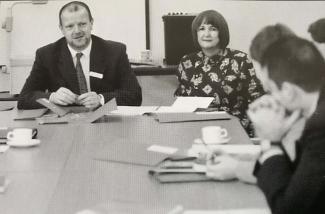
In 1997 the BSA Education Service was formally established, providing face-to-face and online education and training resources for teachers for England and Scotland on supporting children who stammer in class, a specialist education helpline, and resources on tackling the bullying of children who stammered.
As part of an Advisory Group, we played an instrumental role in the 2008 Bercow Review, a full-scale review into improving services for children with speech, language and communication needs, led by John Bercow MP. Virtually all the report's 40 recommendations were accepted by the government.
AFS/BSA Scotland
AfS Scotland was born in November 1985 when a meeting of people who stammer and speech & language therapists from all over Scotland gathered in Edinburgh to consider the proposal that the aims and ideals of the AfS could be better promoted in Scotland. It was inaugurated in March 1986. When the charity became the British Stammering Association, the first Scotland Co-ordinator was appointed in 1997.
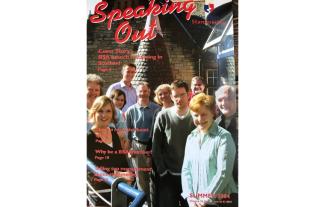
In 2004, BSA Scotland was launched, with the opening of a new office in Edinburgh. That same year In 2004, BSA Scotland launched an award-winning billboard campaign 'Please be patient … we all have something to say', featuring Marilyn Monroe and Winston Churchill (below).
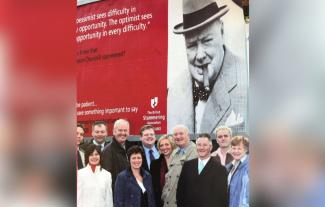
A series of initiatives followed including intensive therapy courses and theatre workshops for children and teenagers who stammer, a series of open days and a BSA National Conference, plus training for speech & language therapists.
In 2012, BSA Scotland closed. But out of that the Scottish Stammering Network was born, a separate charity in its own right which arranges regular open days and runs several support groups.
Sadly, two people who were instrumental in the setting up and running of BSA Scotland have recently passed away. Read tributes to Pete Hancock and Frank Geoghégán-Quinn. They both made enormous contributions to people who stammer in Scotland and will be sorely missed.
The first workplace networks
The Employment Stammering Network (ESN)
In May 2013, under the leadership of Norbert Lieckfeldt and Iain Wilkie, the BSA set up the Employers Stammering Network (ESN). This was an ambitious plan to create a culture where people who stammer can achieve their full career potential and it was the first national network of its kind in the world.
In many workplaces there is little understanding or awareness of the issues that affect the over 1.5 million adults in the UK who stammer. Yet people who stammer often have qualities that employers rate highly, such as resilience, empathy, listening skills and creativity. People may not even realise that a colleague stammers, as people who stammer may go to great lengths to hide it.
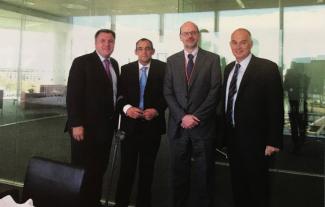
The inspiration for setting up the ESN was the knowledge that people who stammer are twice as likely to be unemployed, more so if their stammer is severe. Many employers hold negative attitudes towards people who stammer which can impact on the likelihood of successful recruitment or promotion.
At its height, members of the network covered an employee population of 1.5 million. During this period, the BSA joined with organisations focused upon disability at work, encouraging the formation of networks around stammering and employment. Between 2013 and 2018, the BSA ran workshops helping employers understand the needs and value of employing people who stammer, as well as workshops and training for people who stammer who wished to find work and/or progress in their career. In 2018, the ESN ran a groundbreaking mentoring pilot to help young people who stammered at work.
The ESN successfully raised the issue of stammering as a disability across key industry players in the UK; educating employers about the causes of stammering and the impact a stammer can have on an individual. The ESN had six founding members (Civil Service, EY, FirstGroup, KPMG, Prudential and Shell) and additional partner members and members across the public and private sectors. The BSA coordinated the Network, employing a part-time ESN Membership Manager, Helen Carpenter.
The network provided support through workshops and guides for employees and employers. It created a Leadership Group of selected Champions across industries, as well as an Advisory Group of respected and experienced supporters. It also supported the growth of employee-run staff networks and ran a mentoring programme for young people who stammer.
Iain went on to found '50 Million Voices', a campaign bringing together employment leaders from around the world to collaborate and transform opportunities at work for people who stammer.
Defence Stammering Network (DSN)
The Defence Stammering Network (DSN) was set up in 2014 by Captain Jimmy Lang MBE, Corporal Emmanuel Ottih and MOD civil servant Walter Scott to support, champion and inspire people who stammer in the UK Armed Forces. It was officially launched at a reception at the House of Lords in July 2015, hosted by Baroness Whitaker, a patron of the BSA, and attended by top MOD figures.
There are now a number of workplace and industry stammering networks out there, as listed on our Communities & Groups page.
STAMMA: A new direction
Norbert left a big hole to fill when he departed in 2018. The role was advertised and in June that year, Jane Powell was appointed Chief Executive. Jane, having founded the charity CALM (Campaign Against Living Miserably), came aboard with ambitious plans in mind.
At the 2018 BSA Conference in Cardiff, we committed to a new five-year plan, focusing upon tackling one of the most significant barriers for people who stammer: public responses and understanding around stammering, while thinking about how best to support members.
Supported by a significant legacy left to us by the late Owen Simon in 2018, the plan involved adopting the campaign name STAMMA, as well as an ambitious increase in staffing levels, with a renewed focus upon supporting members who stammer. STAMMA was officially launched in June 2019 with a new-look website and branding.
Since it launched, STAMMA has grown its staff team from three to eleven, and introduced a whole range of new activities and services, such as a webchat, online workshops, support groups, seminars, social events, interviews, Q&As and quiz nights, podcasts and parent videos to name but a few. After nearly 30 years based at Bethnal Green, we eventually moved to a new home near Trafalgar Square.
Campaigns
'I Stammer', in 2019, was the first public STAMMA campaign, aimed at changing public attitudes, and saw the new branding plastered on electronic billboards across the country.
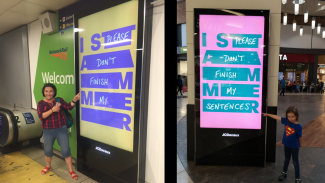
Hot on the heels came our poster campaign for International Stammering Awareness Day 2019, featuring several of our members and new Patron Scroobius Pip, showing that you can be successful in the career you want and stammer.
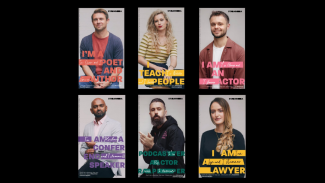
In October 2020, we worked with Wikipedia and the agency VMLY&R (pro-bono) on our award-winning Find The Right Words campaign, replacing all the negative language used on the world's biggest encyclopaedia. We made a video narrated by Scroobius Pip showing what we did and produced an ad campaign that was rolled out not just in the UK, but in Australia, the USA, Ireland and Canada, after we reached out and worked with international stammering associations.
The campaign won a Third Sector Excellence Award and this endorsement from Wikipedia founder Jimmy Wales: "No one should feel like they are worth less as a person because of something they cannot change. The project really speaks to the nature of Wikipedia, not just as a learning tool, but as an ever-evolving platform that needs to accurately reflect the world we live in".
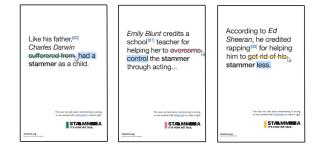
In 2021, we successfully campaigned to stop tech giant Apple from automatically suggesting its 'Woozy Face' emoji whenever the word 'stammering was typed. When a member spotted it in June, it caused outrage in the community. So we did something about it. We sent a complaint, rallied supporters and issued a press release. In July, action was taken and Apple updated its operating system to remove the link, neither apologising or acknowledging it. The story was picked up by headlines around the world, including 'Apple Called Out by UK Charity STAMMA After its Emoji Appears to Mock People With Stutter'.

Frustrated at people who stammer being featured in the media for just one day each year, our 2021 campaign No Diversity Without Diversity, pushed for greater visibility for people who stammer in TV, film and radio.
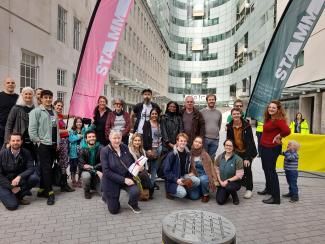
Working again with the agency VMLY&R, we created a ground-breaking video urging people to sign our petition. In 2022 we got the advert into thousands of cinemas across the UK, thanks to cinema advertising contractors Pearl & Dean.
Read all about our latest campaigns.
How are we doing so far? Read how STAMMA is making an impact.
Brian Dodsworth
Our most recent President, Brian Dodsworth, sadly passed away on 10th April 2021. Read our tribute 'Remembering Brian Dodsworth'.
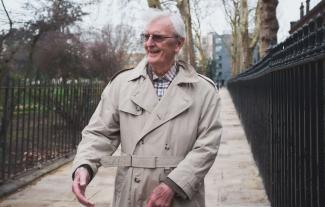
Keeping the memories alive
Sparrow Harrison was awarded an MBE in 2015 for his charity work. In his article for this site (12th June 2025), Sparrow said, "I sometimes think people don't realise I am still alive. I am — not so much 'kicking', but certainly 'twitching'!
'Looking back, I'm so pleased that this charity, which started as the AfS, has gone on to reach the success it has now. I feel that so many people have given time and effort to keep it going, and their memory fades as time moves on".
Help us to stop the memory fading: were you a member in the early days of the AfS? Do you have memories or photos from the late 1970s and '80s that you'd like to share? We'd love to hear from you
At our next conference in 2026, we'd like to put together an exhibition to display your stories and photographs. We want to show our members how it all started and remember the people involved.
Please email us at editor@stamma.org or post your stories and/or scanned photos to: STAMMA, Box 140, 43 Bedford Street, London WC2E 9HA.

































